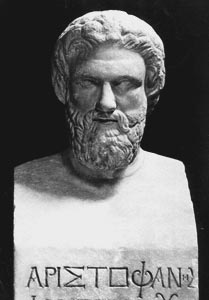William Arrowsmith (tr.) after Aristophanes, in Clouds, line 914 (our emphasis, citing 909-914)
This apocryphal line is found quoted only from the Arrowsmith translation.
Misattributed
Kontext: [909] Philosophy: Why, you Precocious Pederast! You Palpable Pervert!
[910] Sophistry: Pelt me with roses!
[910] Philosophy: You Toadstool! O Cesspool!
[911] Sophistry: Wreath my hairs with lilies!
[911] Philosophy: Why, you Parricide!
[912] Sophistry: Shower me with gold! Look, don't you see I welcome your abuse?
[913] Philosophy: Welcome it, monster? In my day we would have cringed with shame.
[914] Sophistry: Whereas now we're flattered. Times change. The vices of your age are stylish today.
(heavily rewritten and embellished tr. Arrowsmith 1962, p. 70 http://books.google.com/books?id=UNlxAAAAIAAJ&q;=%22Times+change.+The+vices+of+your+age+are+stylish+today%22)
